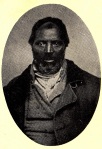
This is a new article concerning my Great, Great Grandfather Bartholomew Figures Moore. For particulars see NC Corrupt Governor Alert and link Bartholomew F. Moore: Tribute To/On Holden/State V Will specifically State V The Slave Will 1834, My G, G Grandfather Wins
*************************


In 1834, on a plantation in Edgecombe County, a slave named Will refused to share a hoe he had made with his own hands, an act of defiance that got him shot in the back by his white overseer. As he lay wounded, Will reached up and fatally slashed his attacker on the hip and the arm, earning himself a trip to the gallows.Josh Shaffer, The News & Observer, June 8, 2017
The upshot was a landmark decision of the North Carolina Supreme Court that was a major step forward in the ongoing definition of the status and rights of enslaved people.
Will was sentenced to death in the Edgecombe County Superior Court, Judge Donnell presiding, but plantation owner James S. Battle became convinced that Will had acted in self-defense and so he hired Bartholomew F. Moore to represent Will on appeal. In an opinion written by Justice William Gaston,
the Supreme Court reversed Will’s conviction — holding that, if a free
man was entitled to the defense of self-defense or to a lesser charge of
manslaughter, then the same analysis should apply to an enslaved
person. This was a step forward. It moved away from Justice Thomas Ruffin‘s earlier opinion in State v. Mann,
in which Ruffin seated his reasoning on the nature of slavery, while
Justice Gaston, four years later, focused on Will’s humanity, not his
legal status as property.
Will’s case is recognized
as a landmark. And so, on June 10, 2017, a historical marker is erected
where his case began, at 275 New Hope Church Road in Battleboro, North
Carolina.

No comments:
Post a Comment